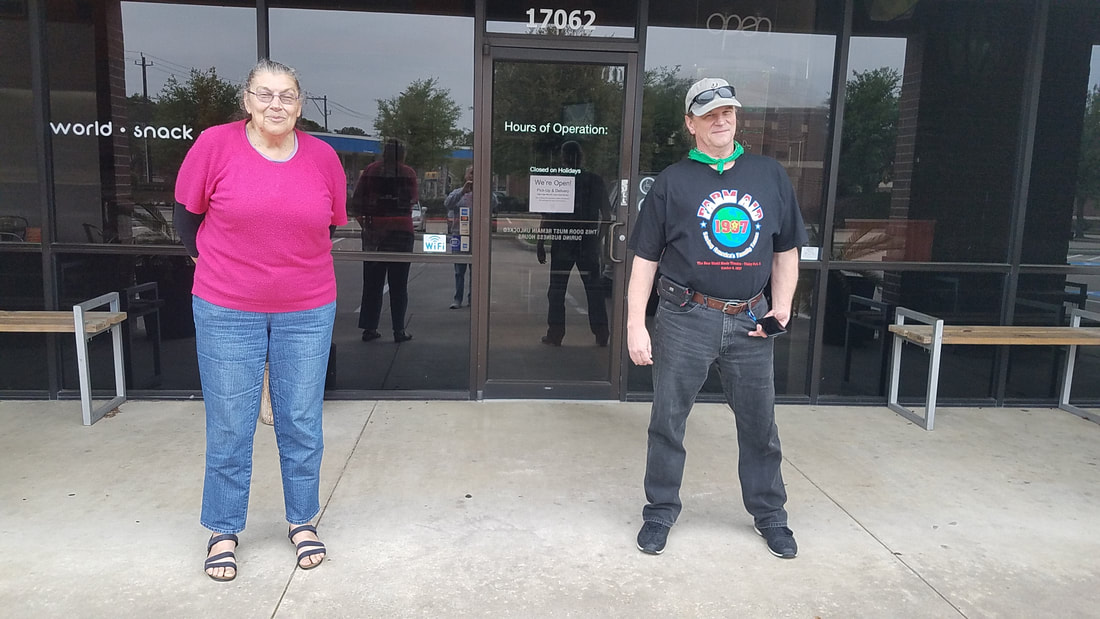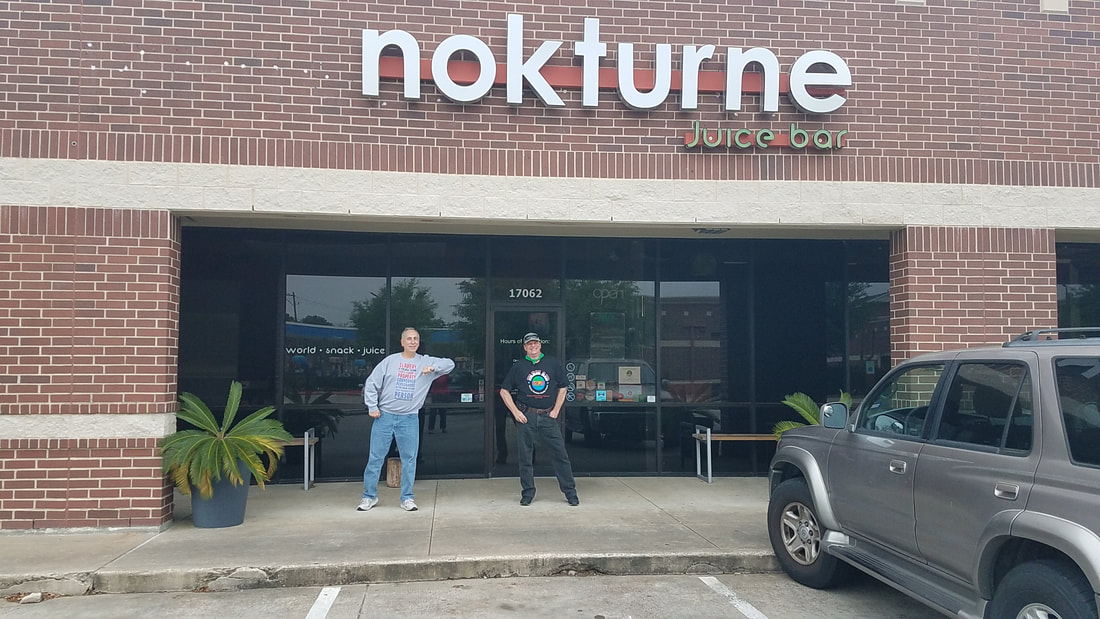|
We got our Internet connection fixed this morning, after three or four days of spotty-to-nonexistent service. Sadly, it required switching from a locally-owned provider, Phonoscope, to the AT&T Death Star. (Our complex allows only those options.) So now the story of the past weekend's Green Party district conventions can be uploaded for the world to see. Janis Richards and I did make the trip to Nokturne in Clear Lake Saturday to meet up with Hal J. Ridley, Jr., as planned. Some folks advised against it. Nokturne itself was not even open for pickup and delivery, with weekend hours shifted to 5-11 pm. We got all the necessary paperwork signed; as a bonus, Ridley and his guitar provided some music. Despite our efforts, GPTX was able to arrange a consolidated district convention via a Zoom conference Saturday evening. We confirmed the nominations of Ridley in Congressional District 36 and two other candidates in multi-county district races. It was also revealed that three of our candidates did not win enough support to gain nomination, and two of those three actually paid their filing fees.  GPTX co-chair and US House candidate Hal J. Ridley, Jr., at the in-person TX-36 convention, 21 March 2020 GPTX co-chair and US House candidate Hal J. Ridley, Jr., at the in-person TX-36 convention, 21 March 2020 Results First The list below includes all candidates filed to run under the Green Party banner for districted legislative seats, whether or not their districts lie entirely within a county, and whether or not their applications included the new filing fees.
US House of Representatives
Texas Senate
Texas House of Representatives
So as of now there are six Green candidates set to appear on ballots this fall, with three statewide nominees still to be determined. Three of the six are running in Bexar County, but only a few precincts in Greater San Antonio will have more than one of the districted Greens (Wakely, Villarreal, and Padrón), in areas where those districts overlap. Nerd Alert: Re How House Districts are Drawn in Texas As one might expect, districts all in one county are mostly in the urban metropolitan counties, where most of the Green organization is found. For counties with enough residents for two or more State House districts, which represent about 200,000 people each, Texas redistricting practice lays out all those districts within their county limits, with perhaps one district spilling over. The 14 most populous counties—Bexar, Cameron, Collin, Dallas, Denton, El Paso, Fort Bend, Galveston, Harris, Hidalgo, Jefferson, Tarrant, Travis, and Williamson—are set up that way. Some districts cover portions or entireties of two counties, such as HD-45 in Hays and Blanco Counties. State Senate Districts, containing almost a million people each, are freer to straddle county lines even in urban areas. A Rebuilding Year for GPTX Lest anyone worry overmuch about candidates paying their filing fees for nothing, the fee to run for Texas House is $500. That's a lot of money for some of us, but nowhere near the $3,125 that Ridley, Jr., paid to run for US House. And lest anyone wonder why Texas Greens had so many D'OH! incidents in its nominations process, it can be attributed to a combination of possible factors, but it comes down to at least these two:
The second factor above has also historically resulted in people filing to run as Greens—mostly in the Occupy the Ballot days of the early-to-mid 2010s—and not keeping up with the financial filings required by the Texas Ethics Commission. That same Texas Ethics Commission, by the way, has ruled that the financial filing rules apply to all GPTX candidates in 2020, irrespective of whether they have paid the new fees to run. Someone, we won't say who, mentioned during Saturday night's conference call the rumor that some of our fee-paying candidates had their fees paid by a third party. I don't like to traffic in rumors, but a third factor might be added to the two above: that Democrats might file to run and fumble the nomination process just to make the Party look incompetent. But that's foolish: It doesn't cost hundreds of dollars to make GPTX look inept at political organizing, as we are perfectly capable of falling on our faces unassisted, thank you very much. If we find any information to flesh out that rumor, we will post it here as soon as we stop laughing. Planning a VIdeo Series It looks as if all active Greens in Texas need to get better acquainted with How Things Work in this state. This is likely as true for veteran Greenies as for recent arrivals, But it will be especially true when the Democratic National Committee's chicanery awards the presidential nomination to former VP Joe Biden, driving progressive Democrats out of the party perhaps for good, with many fleeing to the Greens. After the highs of 2016, including hosting a successful national convention, GPTX has hit some rough patches. Not only with the state and county chapters need to get back on their feet in terms of increased membership, but they will also need to make sure that everyone is on the same page regarding the purpose and functions of the Party. It may seem like a major pain, this reinvention and improvement of our partisan wheels, but, as an educator by disposition, I look forward to quite a bit of Greensplaining in the coming months and years. To that end, I have begun outlining of a series of videos on How to Be Green in Texas. Learning by online video seems to be in fashion of late, and for younger learners in particular it may aid in retention of the information as well as easy access to things one may have forgotten. (Yes, there should and could be an actual book to accompany the digital media.) It may take a year or two to put this whole thing together, a few hours every week, but I'm willing to dedicate myself to this project. As for whether circumstances will conspire to help or hinder the project, like everything else during these days of "fucking global crisis," it's too early to tell. Comments are closed.
|
Blogging Sporadically since 2014Here you will find political campaign-related entries, as well as some about my literature, Houston underground arts, peace & justice, urban cycling, soccer, alt-religion, and other topics. Categories
All
Archives
April 2023
|

 RSS Feed
RSS Feed